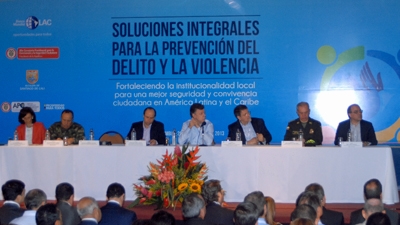Twenty years ago, Cali was on the frontline of one of the world’s most dangerous wars. A group of drug traffickers in that city clashed violently with their enemies in Medellin, led by Pablo Escobar.
As depicted recently in the soap opera El Patrón del Mal, attacks against unarmed civilians, murders committed by hit men and fighting between armed groups were everyday occurrences.
This week, Cali received some 450 guests from around the continent, who came to discuss the problem of crime and violence that devastated this city and that now affects the entire region, from the suburbs of Chicago to the highways of Central America and the border regions of Paraguay.
With a view of Cali’s verdant hills, the delegates met at Hotel Intercontinental on Wednesday. Military officers in their green uniforms with the Colombia flag entered the conference room while mayors from cities all over Latin America exchanged friendly greetings.
The goal of the event, which was organized by the Cali City Hall, the High-Level Presidential Council for Coexistence and Citizen Security and the World Bank, was to learn from the positive experiences of cities like Cali and Medellin, as well as from other areas in the region that have implemented initiatives to improve citizen security.
The event brought together representatives of non-governmental organizations from small cities that promote music or sports programs, representatives of international agencies concerned about the negative effects of crime on development and local and national government officials aware of the seriousness of the problem.
Working with young people
Participant Lucila Gutierrez Carrión, of SENA Valle, a youth training government entity in Colombia, believes that much can be done to develop integral solutions to prevent crime and violence. “We know we can contribute a lot if we work in an integral manner with young people.”
“There are challenges since we start with the premise that violence and crime are avoidable. They can be prevented. And that is our greatest challenge. Our duty as members of society is to do everything within our power to achieve this objective,” said Colombian President Juan Manuel Santos.


